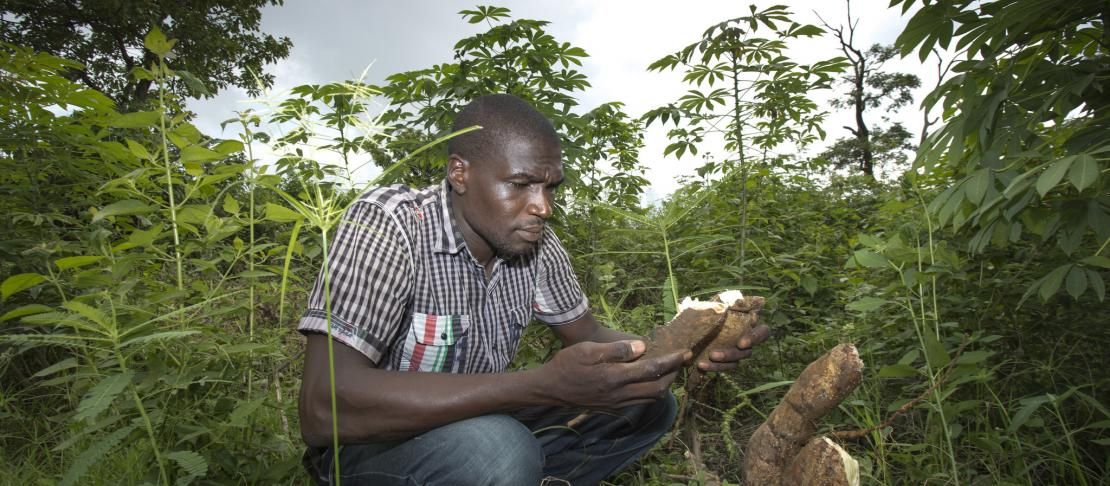West African students learn about climate-smart agriculture

Workshop introduced students to the concept and practice on climate-smart agriculture.
Recently, a curriculum developed by CCAFS on climate-smart agriculture (CSA) was used to teach students enrolled in the West African Science Service Center on Climate Change and Adapted Land Use (WASCAL) Master's programme on Climate Change and Energy at University Abdou Moumouni of Niamey Niger (UAM) at a 20-hour workshop. The workshop was about climate change, agriculture and food security, and utilized a specialized curriculum aimed at building capacity of decision-makers and implementers in Africa.
Agriculture in Africa is expected to be impacted by climate change in ways that could lower agricultural productivity and increase pests and diseases in crops and livestock. Therefore, there is a strong need to adapt to climate change in Africa. Although total emissions from Africa are comparatively low, on a relative scale the agricultural sector contributes significantly to greenhouse gas emissions in Africa. Solutions like those provided by CSA are therefore needed, which not only enable countries to adapt to climate change, but also help adopt low-emissions development pathways. Dissemination of knowledge on CSA is crucial to its success and educating future African leaders and decision-makers on CSA provides a first step to realizing CSA’s potential for adaptation and mitigation in Africa.
The 20-hour workshop was initiated with an introduction to the challenges of climate change and the possibilities of CSA. Then students were introduced to the CSA curriculum which includes a reader and workbook. The reader provided comprehensive subject knowledge to students, while the workbook consisted of exercises intended to increase understanding. The curriculum is tailored to meet the needs of the target user groups and packaged to provide different entry points and structures depending on users’ knowledge of the subject, be they decision-makers or implementers. The curriculum is flexible and can be organized to meet the specific needs of participants. To help make the learning experience engaging, it incorporates visual resources, video links, and success stories.
The curriculum covered:
- The CSA concept: Providing users with an understanding of the concept of CSA, the contexts for application and the relevance of CSA in Africa.
- The design of CSA policy, processes and priorities: Developing skills for assessing challenges and opportunities and designing CSA policies and programmes, including finance options and evaluation methods.
- The Technical and institutional interventions for CSA: Developing an understanding of management options for crops, livestock, aquaculture, and fisheries and landscapes and CSA intervention options at an institutional level.
- The CSA in value chains: Developing an understanding of assessing and managing CSA across value chains, as well as entry points for specific value chains, with examples of 14 value chains relevant to the African context.
The students at UAM were asked to focus on the first topic – the CSA concept. For this topic the reader provides background knowledge on what CSA is, why we need it, practices in Africa, success stories and visual resources. The workbooks supplemented these topic with 11 exercises meant to encourage students to reflect on both practical and conceptual issues. The exercises helped students gain a deeper understanding of the challenges of climate change and helped students reflect on implementation of CSA. Dr Falalou Hamidou, Scientist at the International Crops Research Institute for the Semi-Arid Tropics (ICRISAT) Niger and Maître de Conferences University of Niamey Niger , as the course organizer, used his own experiences and data from ICRISAT to provide the students with further examples. The workshop encouraged participation and students well appreciated the structure and methodology of the course. Dr Falalou Hamidou describes the process: “We did the exercises section by section, students responded based on the content of the curriculum and I also asked them to give their points of view on how relevant the suggested solutions were, what are the cases in their respective countries, and after this training what roles they expect to play in CSA implementation, etc.”
The workshop also focused on the relevance of energy in the implementation of CSA , and how energy can be combined with CSA to help reach its objectives, in order to provide the link between the CSA curriculum and the WASCAL Master's programme.
Further readings
- Website: CSA Guide
Sara Guizani is Research Student Assistant at the CCAFS Coordinating Unit.



